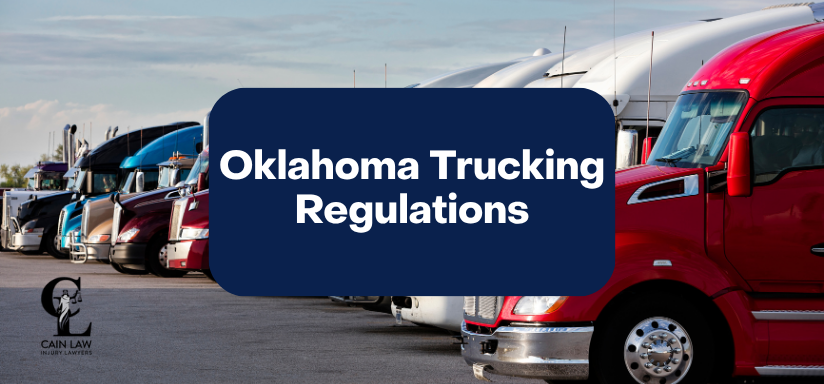
Oklahoma trucking regulations are in place to protect motorists and communities throughout the state. These regulations overlap with federal rules that apply to vehicles, drivers, and companies engaged in interstate commerce.
When these parties fail to abide by these regulations, the result can be catastrophic accidents, massive property damage, and life-threatening injuries.
If you’ve been hurt in an accident involving a commercial truck, contact Cain Law to discuss your legal options in a free consultation. You may be entitled to seek compensation for your injuries.
Oklahoma Trucking Regulations
The Transportation Division of the Oklahoma Corporation Commission is responsible for enforcing Oklahoma trucking regulations. Here’s an overview of some of the critical standards to which drivers and trucking companies are held in the interest of public safety and other considerations (see 165:30-1-1 for more details):
- Obtaining a License (165:30-3-1) – All trucking companies that intend to transport property within the state of Oklahoma must apply for and obtain a license before commencing operation. The application requires details like basic business information, the trucks that will be used to transport cargo, the intended type of operations, and proof of compliance with applicable standards.
- Records and Inspections (165:30-7-7) – Oklahoma requires all trucking companies to make their transportation records available to Commission inspectors upon request. These documents must be kept at the carrier’s primary place of business or, if they’re based out of state, at an in-state location chosen by the Commission. Drivers must also stop and submit to inspections of their vehicle, cargo, and shipping documentation upon the request of motor carrier enforcement officers.
- Shipping Documentation (165:30-3-32) – All shipments carried by Oklahoma trucking companies must be accompanied by written documentation of the contents of the shipment, the shipment date, points of origin and destination, sender and recipient information, weight, and other details. Every shipment requires its own documentation. Electronic documentation that conforms to these standards is also acceptable.
- Minimum Standards (165:30-3-34) – Trucks must meet specific minimum standards to legally and safely operate on Oklahoma roads. They must meet state and federal safety equipment requirements. All vehicles must be registered by weight. They must also be designed and properly equipped to transport the intended goods. To ensure public safety, all cargo must be loaded safely and within acceptable weight limits. Transportation of dangerous substances must comply with all safety and placard requirements. Finally, all trucks must be used as designed and specified by the manufacturer.
- Loading Capacity – Safety Compliance (165:30-3-71) – Truck weight limits in OK are established by the state and are strictly enforced. Drivers, trucking companies, and cargo loaders are all responsible for ensuring safe loading within the designated limits. The Commission can conduct a compliance audit based on the frequency and pattern of violations, fleet size, type of operation, and overweight excess. The auditor will consider the weight listed on a certified load ticket or scale ticket to be the vehicle’s actual weight, barring other reliable evidence. Carriers may apply for a permit authorizing the use of an oversized or overweight vehicle.
- Compliance with Laws and Regulations (165:30-13-31) – Household goods carriers are subjected to somewhat different regulations than carriers of other materials. They are still responsible for operating within the rules set out by state and federal regulators, including rules regarding vehicle size and weight limits and the licensing of drivers. All vehicles must meet these standards or risk being unable to operate in Oklahoma.
- Hazardous Materials (165:30-17-1) – Hazardous materials transport in OK is subject to many regulations to ensure public and environmental safety. All carriers transporting hazardous waste must have a Uniform Hazardous Waste Manifest document detailing the type and quantity of the waste being transported and instructions for handling and signature lines for all parties taking care of any steps in the waste disposal process.
- Insurance (165:30-3-11) – Oklahoma trucking companies must carry valid coverage through an approved insurer. They must provide proof of insurance to the Commission and obtain approval. Insurance policies are intended to protect the public from accidents, including injuries, death, environmental damage, property damage, and more. The state outlines minimum coverage requirements for a variety of cargo and vehicle types, starting at $300,000 for small trucks carrying non-hazardous materials and increasing to $750,000 for large trucks carrying dangerous cargo. Failure to maintain the required insurance can result in the suspension of a carrier’s license to operate in Oklahoma.
These are just a few of the key regulations that apply to Oklahoma truck drivers and their employers. Trucking companies are responsible for ensuring they abide by these rules. Failure to do so can result in tragic accidents for which they may be liable and stiff penalties.
Truck drivers must also meet Oklahoma CDL requirements and obtain the required license to operate commercial vehicles. They must adhere to Oklahoma hours of service laws and not drive more than 60 hours within a seven-day period or 70 hours within an eight-day period.
Important Federal Regulations
Oklahoma truck drivers operating across state lines are also bound by regulations enforced by the Federal Motor Carrier Safety Administration. These include:
- Hours of Service – Federal and Oklahoma hours of service regulations intend to prevent driver fatigue and ensure safer roads.
- Safety Inspections – Truck safety standards in Oklahoma and nationwide mandate regular inspections to ensure safe vehicle operation.
- Securing Loads – The FMCSA regulates cargo securement to ensure safe, stable loads and prevent conditions that can cause accidents.
- Alcohol and Drug Testing – Drivers must undergo regular drug and alcohol testing and must also be tested following accidents.
How a Lawyer Can Help If a Truck Driver Violated Regulations
When a driver or carrier violates trucking industry laws in Oklahoma and causes an accident, the effects can devastate victims and their families. A truck accident lawyer in Oklahoma City can help you seek compensation for your injuries by investigating to determine whether the driver or another party violated specific state and federal regulations. By establishing the liability of these other parties, your attorney can pursue the justice you deserve.
Cain Law has fought for Oklahoma truck accident victims for over 30 years. We’re prepared to help you in your legal battle following an accident with a commercial truck. Contact us today for a free case consultation.
